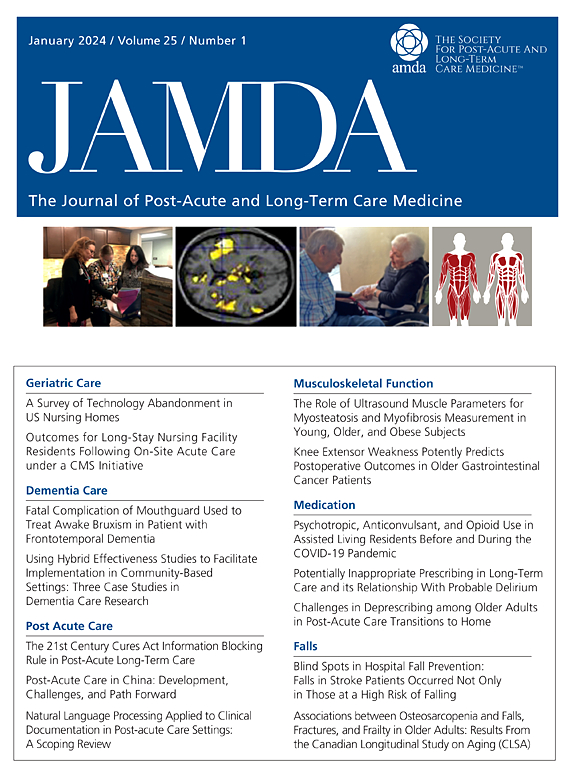Treatments for Depression for Older Adults Living in Long-Term Care: A Systematic Review and Network Meta-Analysis
IF 4.2
2区 医学
Q2 GERIATRICS & GERONTOLOGY
Journal of the American Medical Directors Association
Pub Date : 2025-04-11
DOI:10.1016/j.jamda.2024.105435
引用次数: 0
Abstract
Objective
To assess the comparative efficacy of interventions on depressive symptoms and disorders in older adults living in long-term care (LTC).
Design
Systematic review and network meta-analysis.
Setting and Participants
Older adults living in LTC or equivalent settings.
Methods
We searched 6 electronic databases and gray literature sources to identify randomized controlled trials describing pharmacologic or nonpharmacologic interventions. Studies had to measure depression as an outcome in persons living in LTC. Study inclusion and study quality were assessed in duplicate. Population characteristics, descriptions of intervention and control treatments, and end-point depression outcomes for each treatment were extracted from included studies. A network meta-analysis using the standardized mean difference (SMD) of depression scores was completed using a random effects model.
Results
A total of 182 studies were included in the review. The network meta-analysis was completed with 147 studies and included 31 treatment conditions. Compared with usual care, horticulture therapy (SMD, −6.85; 95% Credibility Interval, −8.49 to −5.22) and cognitive behavioral therapy (SMD, −1.98; 95% Credibility Interval, −2.91 to −1.05) were the most efficacious treatments. Animal therapy, group reminiscence therapy, multicomponent nonpharmacologic treatments, exercise, and socialization interventions also significantly improved depressive symptoms compared with usual care.
Conclusions and Implications
Many nonpharmacologic treatments for depression in LTC have been studied and are found to be efficacious. The low-risk and cost-effective nature of many of the nonpharmacologic treatments makes them ideal for use in LTC. More studies of pharmacologic treatments are needed to inform prescribing for depression in the LTC population. The range of treatments available for depression may help clinicians select therapies individualized to resident needs.
长期护理老年人抑郁症的治疗:系统回顾和网络荟萃分析。
目的:评价干预措施对长期护理老年人抑郁症状和障碍的比较疗效。设计:系统评价和网络荟萃分析。环境和参与者:生活在LTC或同等环境中的老年人。方法:我们检索了6个电子数据库和灰色文献来源,以确定描述药物或非药物干预的随机对照试验。研究必须将抑郁症作为LTC患者的结果来衡量。研究纳入和研究质量一式两份评估。从纳入的研究中提取了人群特征、干预和对照治疗的描述以及每种治疗的终点抑郁评分。采用随机效应模型对抑郁评分进行标准化均差(SMD)网络元分析。结果:本综述共纳入182项研究。网络荟萃分析完成了147项研究,包括31种治疗条件。与常规护理相比,园艺疗法(SMD, -6.85;95%可信区间,-8.49 ~ -5.22)和认知行为治疗(SMD, -1.98;95%可信区间(-2.91 ~ -1.05)为最有效的治疗方法。与常规治疗相比,动物治疗、群体回忆治疗、多组分非药物治疗、运动和社会化干预也显著改善了抑郁症状。结论和意义:许多非药物治疗方法已被研究并被发现是有效的。许多非药物干预措施的低风险和成本效益使其成为LTC治疗的理想选择。需要更多的药物治疗研究来为LTC人群的抑郁处方提供信息。抑郁症的治疗范围可以帮助临床医生根据病人的需要选择个性化的治疗方法。
本文章由计算机程序翻译,如有差异,请以英文原文为准。
求助全文
约1分钟内获得全文
求助全文
来源期刊
CiteScore
11.10
自引率
6.60%
发文量
472
审稿时长
44 days
期刊介绍:
JAMDA, the official journal of AMDA - The Society for Post-Acute and Long-Term Care Medicine, is a leading peer-reviewed publication that offers practical information and research geared towards healthcare professionals in the post-acute and long-term care fields. It is also a valuable resource for policy-makers, organizational leaders, educators, and advocates.
The journal provides essential information for various healthcare professionals such as medical directors, attending physicians, nurses, consultant pharmacists, geriatric psychiatrists, nurse practitioners, physician assistants, physical and occupational therapists, social workers, and others involved in providing, overseeing, and promoting quality

 求助内容:
求助内容: 应助结果提醒方式:
应助结果提醒方式:


